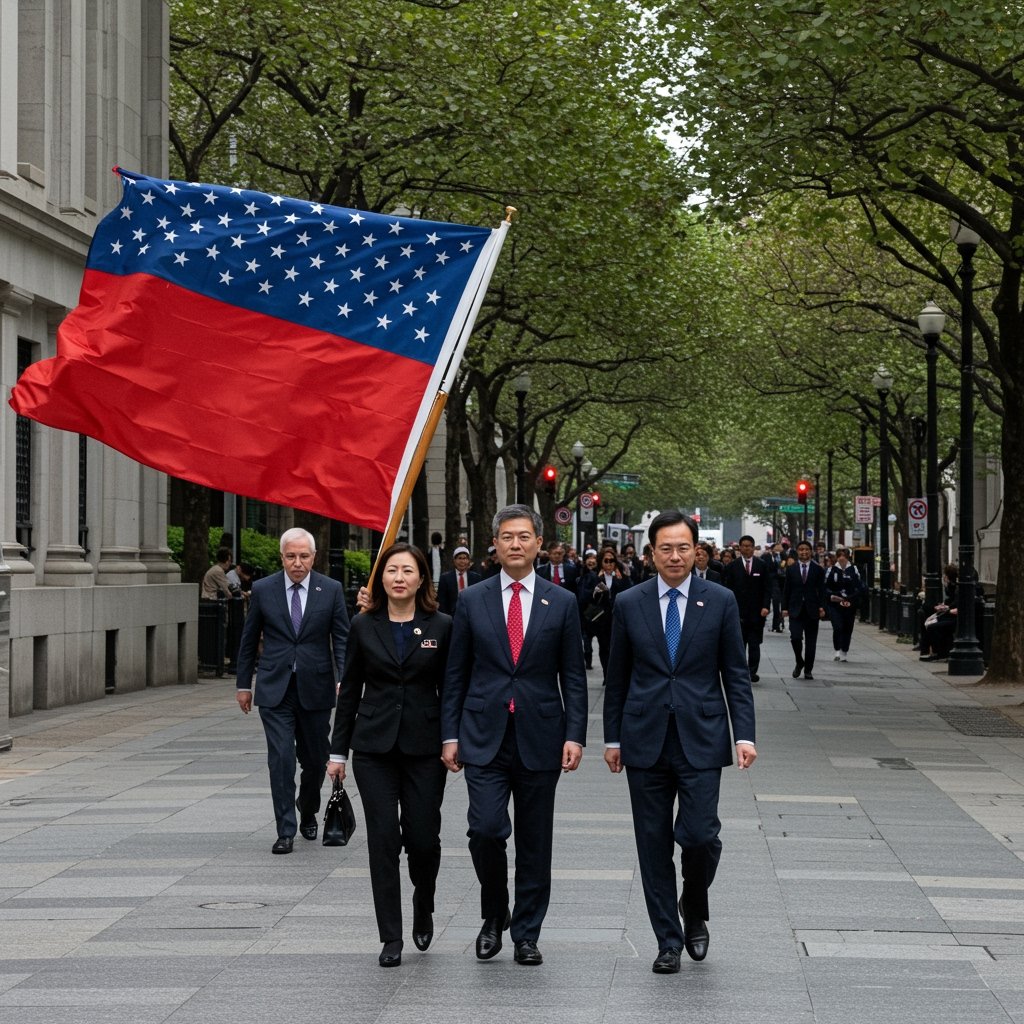Geneva Talks End Abruptly Amid Deep Divisions
Negotiations aimed at easing persistent trade tensions between the United States and China reached an abrupt and unsuccessful conclusion in Geneva on March 28, 2025. The high-stakes discussions, intended to find common ground and de-escalate the economic rivalry between the world’s two largest economies, failed to bridge fundamental disagreements, according to officials from both sides.
Representatives from the U.S. Trade Representative’s office and China’s Ministry of Commerce confirmed the breakdown following several days of intense talks. Both delegations acknowledged that despite extensive dialogue, significant differences could not be resolved, leading to the decision to terminate the current round of negotiations without a clear path forward for immediate resumption.
Core Issues Unresolved: IP and Technology Tariffs
The primary sticking points that led to the collapse reportedly centered on two highly contentious areas: U.S. demands for enhanced intellectual property protections from China and China’s strong opposition to recent U.S. tariffs targeting advanced semiconductor technology. These issues represent deep-seated points of friction in the bilateral economic relationship, reflecting competing visions for technological dominance and fair trade practices.
The United States has long maintained that insufficient protection and enforcement of intellectual property rights in China harms American businesses, stifles innovation, and results in the forced transfer of technology. U.S. negotiators reportedly pushed for stronger legal frameworks, more robust enforcement mechanisms, and greater transparency regarding patent, trademark, and copyright issues during the Geneva talks. They argued that a level playing field requires China to address these structural concerns comprehensively.
Conversely, China expressed firm opposition to the series of tariffs and export controls imposed by the U.S., particularly those specifically targeting its burgeoning advanced semiconductor industry. Beijing views these measures as protectionist, designed to impede China’s technological progress and maintain U.S. dominance rather than address legitimate trade concerns. China’s Ministry of Commerce officials reportedly reiterated their call for the immediate removal of these restrictions, arguing they violate World Trade Organization principles and disrupt global supply chains.
The inability to find a compromise on these specific issues underscores the complexity and severity of the trade dispute. While other topics, such as market access, subsidies, and state-owned enterprises, were likely discussed, the chasm between the two sides on IP and semiconductor technology proved insurmountable in this round.
Escalating Tensions and Global Impacts
The failure of the Geneva talks is seen as a significant setback and escalates economic tensions between Washington and Beijing. Instead of providing a pathway to reduced tariffs or increased cooperation, the outcome signals a deepening of the economic rivalry that has characterized the relationship for years.
This escalation has immediate and potentially long-lasting repercussions for the global economy. One major area of concern is the impact on global supply chains. Uncertainty surrounding trade policies, the potential for further tariffs or restrictions, and the lack of a dispute resolution mechanism compel companies to reassess their manufacturing, sourcing, and logistics strategies. Businesses heavily reliant on components from China or exporting goods to the U.S. face increased costs, planning difficulties, and the pressure to diversify away from traditional supply routes, leading to inefficiencies and potential price increases for consumers.
Furthermore, the breakdown is expected to negatively affect investment flows. Geopolitical risk and economic uncertainty are key deterrents for investors. The failure of these high-level talks creates an environment where cross-border investment, particularly between the U.S. and China, becomes riskier. Companies may postpone or cancel expansion plans, and investors may shift capital to less volatile markets, potentially hindering economic growth in both countries and globally.
Analyst Perspectives and Future Outlook
Following the announcement of the talks’ collapse, financial markets reacted cautiously, reflecting the increased risk. Analysts universally suggest this failure raises concerns about the future of bilateral trade relations in 2025 and beyond. Many experts believe that the unresolved issues, particularly those related to technology, are indicative of a broader strategic competition between the two nations that extends beyond traditional trade disputes.
Trade experts note that without a framework for dialogue and compromise, the likelihood of tit-for-tat measures increases. The U.S. could consider additional tariffs or export controls, while China might implement retaliatory measures, further disrupting trade and economic activity. The lack of a clear path for resuming talks suggests that the current state of elevated tension could persist throughout 2025.
Some analysts view this collapse as evidence that the gap between the U.S. and China on core technological and structural economic issues is widening, making comprehensive trade agreements increasingly difficult to achieve. Others hold out hope that while this specific round failed, the necessity for engagement remains, potentially leading to future, albeit challenging, negotiations on more narrowly defined issues.
Context of Ongoing Trade Rivalry
The failed talks in Geneva occur against a backdrop of several years of trade disputes, initiated with significant tariff impositions by the U.S. in the late 2010s. While a “Phase One” trade deal provided a temporary truce on some fronts, it left many fundamental issues unresolved, including state subsidies, market access barriers, and, critically, intellectual property enforcement and technology transfers. The recent U.S. focus on restricting China’s access to advanced semiconductor technology marked a significant escalation, shifting the emphasis from traditional goods trade deficits to strategic technological competition.
This history underscores that the challenges faced in Geneva were not new but represented long-standing points of contention made more acute by the strategic importance of the sectors involved, particularly high technology.
Conclusion
The abrupt end to the US-China trade talks in Geneva on March 28, 2025, due to persistent disagreements over intellectual property protection and semiconductor technology tariffs, marks a critical juncture in the relationship between the two economic superpowers. The failure not only prolongs the period of heightened economic tension but also casts a shadow over the stability of global supply chains and investment landscapes. As 2025 progresses, the international community will be closely watching for how this breakdown influences future policy decisions by Washington and Beijing and its broader implications for the global economic order.






